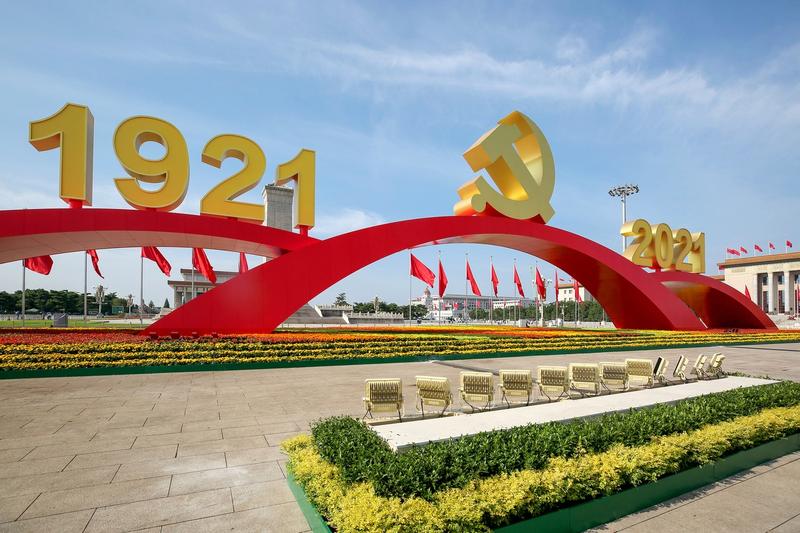 Flower decorations in Tian'anmen Square attracted more than a million visitors after the centennial celebration of the CPC's founding on July 1. (HE JIANYONG / FOR CHINA DAILY)
Flower decorations in Tian'anmen Square attracted more than a million visitors after the centennial celebration of the CPC's founding on July 1. (HE JIANYONG / FOR CHINA DAILY)
For the tens of thousands celebrating the centenary of the founding of the Communist Party of China at Tian'anmen Square in Beijing on July 1, raincoats were an essential part of the organizer's carefully calibrated preparation efforts.
The Beijing Meteorological Service spent months working with the event's organizers, with forecasters monitoring screens and related venues on the day of the celebration to offer timely and accurate weather reports.
Forecasters said that unlike normal weather reports, they needed to collect detailed data down to the minute at certain venues in Beijing.
"The forecast that day was like no other," said Zhao Wei, chief forecaster for the service.
"For example, around 9 am on a summer day, the temperature in most areas in Beijing is not high, but the weather at Tian'anmen Square with no shelter may be scorching," she said.
Temperatures in a weather report are usually recorded by meteorological instruments. However, for major events, more detailed information is needed, Zhao said.
That day's weather forecast covered two celebration venues-the square and the National Stadium in the city's north. "Some forecasters, including me, were stationed at the venues. We sent back demands for weather forecast from the site to the forecast headquarters for experts to make accurate analyses. Then we interpreted the forecast to staff members at the venues so they could make decision," she said.
For example, on June 30, the day before the celebration, forecasters told the command center at the square that a thunderstorm would come between 8:30 pm and 9 pm before the center evacuated staff members who were preparing for the celebration at the scene. Protective measures were also taken, Zhao said.
Zhao and her colleagues provided hourly forecasts and made reports if necessary.
"We were under a lot of pressure. Beijing's weather is complicated and unstable in summer. Requirements for event weather services were relatively high, and there was no room for error. If a mistake occurred, a lot of work would not be able to continue smoothly," she said.
In November, the Beijing Meteorological Service set up a special climate work group to conduct background analyses of weather conditions at key spots in Beijing's urban areas, especially Tian'anmen Square and the National Stadium.
They combed through climate data over the past 20 years of the square and found that historically on July 1, the weather in Beijing greatly varied, with the highest temperature climbing to 39.4 C and the lowest diving to 15.3 C.
Zhang Tao, chief forecaster with the National Meteorological Center who was temporarily stationed and assisted in the service, compared the weather in June and July in Beijing to China's Monkey King, who is known for his ability to transform instantly.
"The king is able to make 72 changes, just like the rain in the capital," he said.
From mid-March, the on-site construction, rehearsals and other activities were supported by the service. "Forecasters often worked with little rest, sometimes for more than 30 hours," Zhao said.
In June, after the first rehearsal on the square, a new problem arose-seats exposed to the sun would be too hot to sit in.
"We evaluated the influence of factors such as radiation and wind and provided body sensation temperature data to audience members and performers," Zhao said.
Information about wind direction and speed was vital at the National Stadium because of the fireworks show on June 28 during the theatrical performance.
"Forecasters provided information about the wind conditions during the fireworks show. The wind at the stadium during the first half of the performance was minimal, which was relatively unfavorable because there wasn't enough to disperse the smoke. We informed the organizer's staff to pay attention to the smoke spreading to the rostrum," she said.
At the two venues, the service provided weather forecasts and guaranteed the workflow for four rehearsals and two celebrations, the service said.


